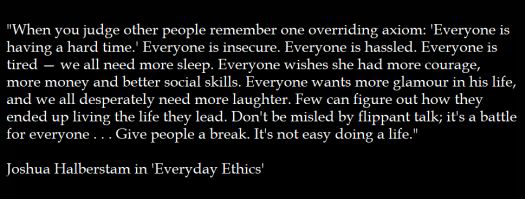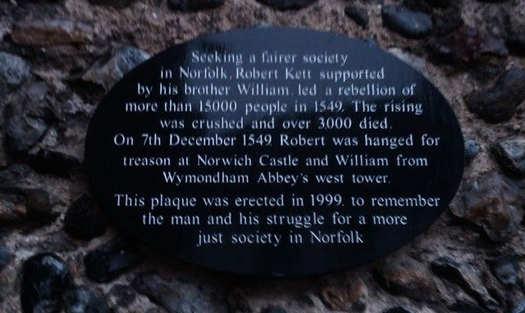
If You Ain’t Marchin’ at Rallies For Causes You Support, Working Within Your Union (or Organizing a Bargaining Unit in a Non-Union Place of Employment) and Are On The Union Executive, If You Haven’t Joined a Left-of-Centre Political Party (Municipally, Provincially and Federally — Parties to Which You Donate Monies Each Month), Are Not Actively Engaged in the Fight Against Racism & Intolerance, If You’re Not Engaged in the Fight for LGBTQ Rights and Offering Your Active Support To Members of Our Transgender Community, If You Are Not Championing UNDRIP and Offering Your Active Support For The Right to Self-Determination for Members of Indigenous Communities — And Do Not Acknowledge That You Are Living On Stolen Land — If You Ain’t Fighting Together With Your Neighbours, and With A Broad Cross-Section of Members of Our Community Towards Achieving a Fairer, More Just Society for All — And Are Not Actively Engaged in That Fight — You Ain’t a Leftist.
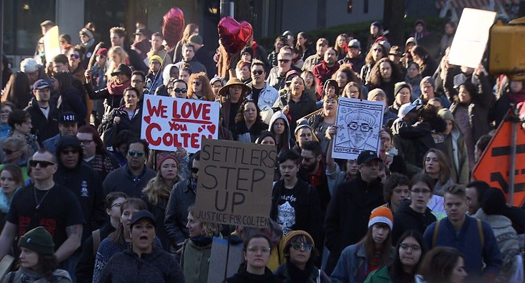 Rally held in Vancouver, Feb. 10, 2018 protesting wrongful death of 22-year old Colten Boushie of the Cree Red Pheasant First Nation fatally shot on a rural Saskatchewan farm.
Rally held in Vancouver, Feb. 10, 2018 protesting wrongful death of 22-year old Colten Boushie of the Cree Red Pheasant First Nation fatally shot on a rural Saskatchewan farm.
Approximately a year and a half ago, in the lead up to the 2018 Vancouver civic election, a former neighbour contacted me to ask if I would be open to discussing with her the latest article by noted left wing journalist and documentarian, John Pilger, on the continuing genocidal debacle in Syria.
As was the case with another former neighbour, Marion had experienced a late in life conversion to leftist politics, dedicating herself to reading Noam Chomsky, John Pilger, Naomi Klein, Owen Jones, Irshad Manji and others.
During the course of our conversation, I asked her how she would involve herself in the upcoming municipal election, which civic party or parties and which candidates for those parties she would be supporting and working to get elected, which groups she had aligned herself with, and what for her were the key issues that drove her commitment to moving the societal agenda forward towards the realization of a fairer and more just society.
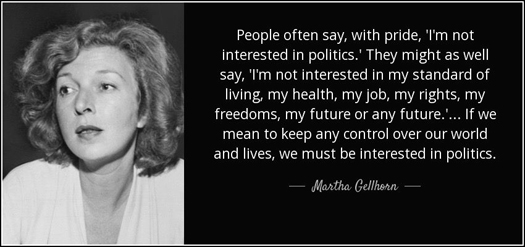
“Oh, there’s no one in the city who’s as left as I am, no one with whom I would affiliate, and no political party that reflects the approach I believe needs to be taken to tear down the old order, and build a new and more democratic society,” Marion told me. “I would never join the NDP — they’re neoliberal collaborators, every single one of them — and there are no other parties on the left who reflect my values, municipally or otherwise.”
I asked her if in the past she had ever worked on a New Democratic Party provincial or federal campaign, or worked in Vancouver’s left leaning, sometimes thought to be Communist, Coalition of Progressive Electors, with whom she had affiliated herself, and with whom she had worked urgently towards the realization of the societal change she felt critical and essential.
The answer: no one, ever, on any issue, ever, never worked with anyone.
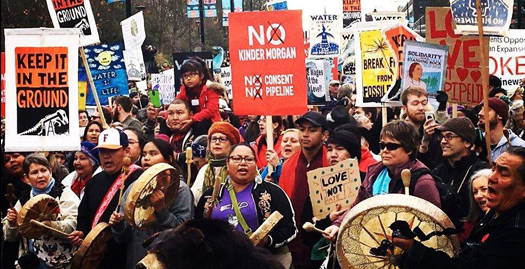
Calling Yourself Left Wing Means Unequivocal Community Activism
Words without action accomplishes nothing. One cannot describe oneself as progressive or a leftist without working with others towards social change. Activism is not ever a solitary activity, change does not occur in isolation.
If you’re going to call yourself a progressive, a leftist or a socialist, here are the pre-conditions necessary to adopt that nomenclature …
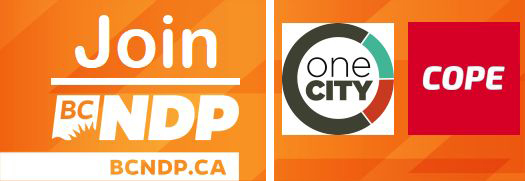
Join a political party. During the course of the 2017 British Columbia election, more than 400 volunteers joined the Re-Elect David Eby campaign, out daily door knocking, participating in burmashaves, delivering NDP literature to constituents across the Vancouver Point Grey provincial riding, out on the streets daily, including teachers who lived in Kitsilano but taught in Coquitlam, Delta, Langley and Surrey — but there they were every day, picking up literature, receiving instruction and their assignment from David’s inspiring (and organized) volunteer co-ordinator, Danika Skye Hammond. The 400 number doesn’t account, either, for the 200 inside volunteers working the phones from 9 a.m. til 9 p.m. seven days a week.
The same energy and passion David Eby’s volunteers brought to his 2017 re-election campaign — and aren’t you glad that David is British Columbia’s Attorney General & Minister of Justice? — an equal number of enthusiastic volunteers brought to Mable Elmore’s campaign in Vancouver-Kensington, Adrian Dix’s re-election campaign in Vancouver Kingsway, and to every BC NDP campaign in every riding across the province of British Columbia. Cuz getting out to actively support and contribute to your candidate’s campaign for office is what democratic socialist / leftist politics is all about.
Gaining friends. Feeling isolated in your community? See people on the street in your neighbourhood, and think to yourself, “I bet they’d be interesting to get to know” — but you’re hardly going to walk up and start a conversation with a complete stranger, someone you don’t even know. Joining with other like-minded members of your community in an important political endeavour that will help to bring about the necessary change you want to see and know needs to occur sooner than later serves to break down the pervasive sense of isolation that plagues contemporary society.
Campaigns for left-of-centre parties rely on volunteers — they can’t raise, and in most cases don’t want, the corporate funds that the Liberals and Conservative parties hoover up in the millions. All of which means: the federal NDP, the BC NDP, COPE and OneCity Vancouver — if you live in Vancouver — need you to contribute whatever funds you can afford.
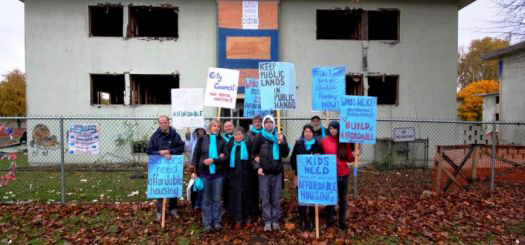 At 11am, this upcoming Saturday, November 30th, hundreds of members of our community will rally at what was once the Little Mountain social housing site, at 33rd and Ontario in Vancouver, to protest the utter lack of progress over the past 12 years in building social and moderate rental housing on the Little Mountain site — rallying, as well, to encourage the provincial government to re-acquire the site sold to Holborn Properties Ltd. in 2007 by the B.C. Liberals, in order to immediately begin the development of social and moderate rental housing, and co-operative and co-housing projects, on the site.
At 11am, this upcoming Saturday, November 30th, hundreds of members of our community will rally at what was once the Little Mountain social housing site, at 33rd and Ontario in Vancouver, to protest the utter lack of progress over the past 12 years in building social and moderate rental housing on the Little Mountain site — rallying, as well, to encourage the provincial government to re-acquire the site sold to Holborn Properties Ltd. in 2007 by the B.C. Liberals, in order to immediately begin the development of social and moderate rental housing, and co-operative and co-housing projects, on the site.
Rallies. If you’ve never attended a rally, or do not regularly attend rallies — on climate change, indigenous issues, tenant’s rights, affordable housing, anti-racism, in support of public education, or any of the myriad issues of societal concern — you are neither a progressive nor a leftist. Rather, you’re a couch potato, or as George Orwell wrote in 1984, a prole:
… a member of the lowest rung of society, of society’s bottom class, those who are only educated to a basic degree and in consequence perform routinized tasks or perform menial labour that requires little thought or engagement, those in society who are utterly without power and who are given over almost entirely to hedonistic pursuit, to drinking and carousing and sex, to attendance at mass sporting events, and those who live in society without any sense of a social conscience or an understanding of the nature of the state, and who simply ‘don’t want to know’ because it taxes their brains, or keeps them away from their hedonistic pursuits — allowing them not to think or engage in common cause with others, or find any meaning in their regrettable, pitiless lives.
Academic studies have shown that only four per cent of the population is at all engaged in the life of society, have joined a political party, are actively involved in their union, have ever attended a march or a rally, or ever engaged with others to bring about societal change towards the realization of a fairer and more just society. That lamentable circumstance must change if we are to survive as a species, if the quality of our lives and that of our children, our friends, colleagues and our neighbours are to prevail.
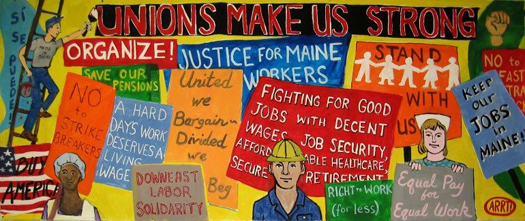
Being a Union member
Unions have a substantial impact on the compensation and work lives of both unionized and non-unionized workers.
1. Unions raise wages of unionized workers by roughly 20% and raise compensation, including both wages and benefits, by about 28%;
2. Unions reduce wage inequality because they raise wages more for low- and middle-wage workers than for higher-wage workers, more for blue-collar than for white-collar workers, and more for workers who do not have a college degree;
3. The most sweeping advantage for unionized workers is in the benefits that are afforded. Unionized workers are more likely than their non-unionized counterparts to receive paid leave, are approximately 18% to 28% more likely to have employer-provided health insurance, and are 23% to 54% more likely to be in employer-provided pension plans;
4. Unionized workers receive more generous health benefits than non-unionized workers. They also pay 18% lower health care deductibles and a smaller share of the costs for family coverage. In retirement, unionized workers are 24% more likely to be covered by health insurance paid for by their employer;
5. Unionized workers receive better pension plans. Not only are they more likely to have a guaranteed benefit in retirement, their employers contribute 28% more toward pensions;
6. Unionized workers receive 26% more vacation time and 14% more total paid leave (vacations and holidays).
Unions play a pivotal role both in securing legislated labour protections and rights such as safety and health, overtime, and family/medical leave and in enforcing those rights on the job.
All the gains that union membership affords — increasingly, for all of us, union members as well as (to a lesser degree) non-union members — have not occurred as part of a befuddingly magical process. All of us live in an increasingly just society arising from the hard work of union members over many, many decades, marching on picket lines, and placing themselves in harm’s way facing down intransigent employers given to violence against their employees (more a feature of the past, although it still occurs today).
If you are a member of a union: your union needs you, needs your energy, your passion and your compassion. Take the training and become a shop steward. Run for a position on your union executive. Get to know your fellow union members, build community, build solidarity of purpose and intent — and, as above, in joining a political party — break down your sense of community isolation while working towards building relationships full of meaning that will enhance the quality of your life, gain new friends, and know that when you go to sleep at night that you’ve made a difference.
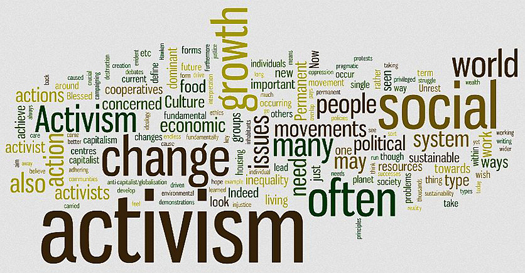
As a leftist, you are perforce an activist — which means you are working actively with others towards the realization of a fairer, more just society.
Other than working with political parties and working within your union, supporting causes that are important to you, marching and rallying with others to bring attention to the issues that require our immediate attention, how else might you address yourself to the issue of societal change?
1. Attend a meeting of your local City Council, School Board, and in Vancouver, the Park Board meetings — find out what the core issues are that these elected bodies area attempting to address, see democracy in action, get yourself on the speaker’s list at Council or Park Board.
Get involved!
2. If you live in Vancouver, make application to be a member of one of the city’s 33 advisory committees that help determine city policy. Every community provides opportunities for citizen involvement in the decision-making process in civic government. Get involved. Make a difference;
3. Attend talks & seminars on diverse topics. Thursday night, November 28th at 7pm, for instance, there’s a seminar, deemed a “conversation,” at SFU Woodwards, 149 West Hastings Street on the topic, Shaping Vancouver 2019: Conversation #4: What’s Happening to Heritage?
4. Change-makers to follow on social media. If you’re not following, regularly reading and interacting with community activists Derrick O’Keefe and housing activist Stephanie Allen — currently, VanRamblings’ favourite, make a difference, live every moment of their lives with integrity, community activists — you can’t honestly say you know what’s going on in our city. Vancouver and District Labour Council President Stephen (pronounced Stefan) Von Sychowski on Facebook is a must-follow, as is recent Coquitlam-Port Coquitlam federal NDP candidate, Christina Gower — my favourite friend find on Facebook in three years, her every post on social media compelling, humane and full of compassion and wit — and former / almost won Vancouver False Creek 2017 NDP candidate and community and transgender activist, Morgane Oger on Twitter — if you aren’t following all five you don’t know what you’re missing. A lot!
The same is true for public education activist, Patti Bacchus — VanRamblings’ favourite non-elected political figure in the province, if not all of Canada, an honest, unafraid truth teller of the first order.
The persons whose names are listed above are agents of change.
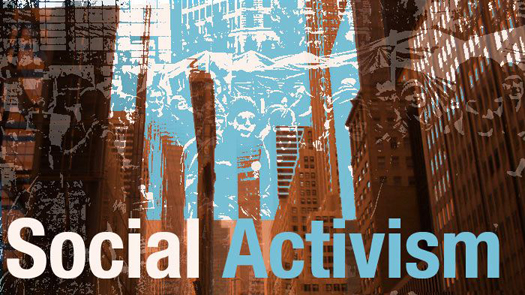
To reiterate: leftist politics requires activism and engagement. Activists work for necessary, meaningful change, and do not in any way hinder it.
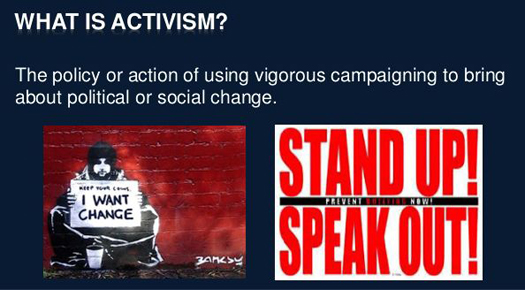
There are two more features to left politics, caring and empathy.
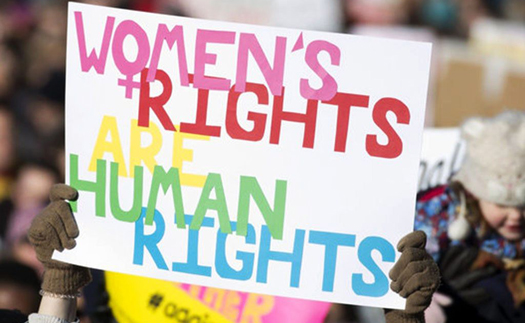
Those who are working on the left are involved in selfless endeavour, requiring not just a little bit of caring, but rather the capacity for immense caring, and activism: we fight with people who for too long have been voiceless in the decision-making affecting their lives. Men fight together with women towards the creation of a fairer, much safer society for our distaff population of partners and spouses, sisters and children.

More than caring, even immense caring, we require throughout our day, every day, empathy for all those around us, for all those persons with whom we come into contact, and on behalf of whom we engage in activism towards a fairer and more just society.
What is required of us always is empathy, of which commodity there is too little in our world, be it at our current city council or school board or, for far too many, in the daily machinations of our lives.
If you are white and middle class, before you speak, put yourself in the position of others — be they persons of colour, indigenous persons, immigrants or refugees, or members of the LGBTQ community — listen to what members of these minority communities have to say about their life experience, and the discrimination they face — and, for good measure — acknowledge your white privilege, that just by very dint of your skin colour, chances are that your experience of life is so very much easier than those who are members of a minority community.
And act accordingly.
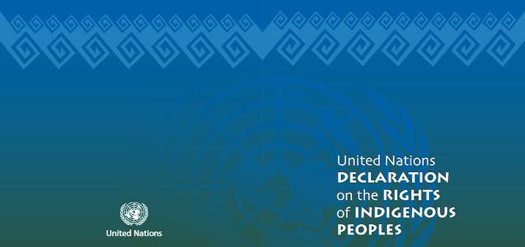
Fight, along with our indigenous peoples and our federal and provincial governments for reconciliation — just yesterday, our provincial legislature unanimously endorsed UNDRIP, the United Nations Declaration on the Rights of Indigenous Peoples, the first province in Canada to do so.
If our governments — municipally, provincially and federally — are committed to reconciliation with our indigenous peoples, that reconciliation has been acknowledged as a core Canadian value, then it is incumbent upon each and every one of us to do all that is in our power to support reconciliation with our indigenous population, to ensure that centuries of genocide are acknowledged, and a commitment to a just reconciliation with our indigenous peoples is atop the social and political agenda.
And, finally, on the topic of empathy, this quote from Joshua Halberstam …
